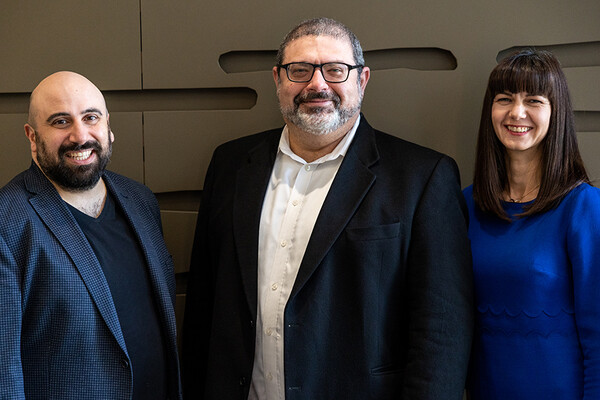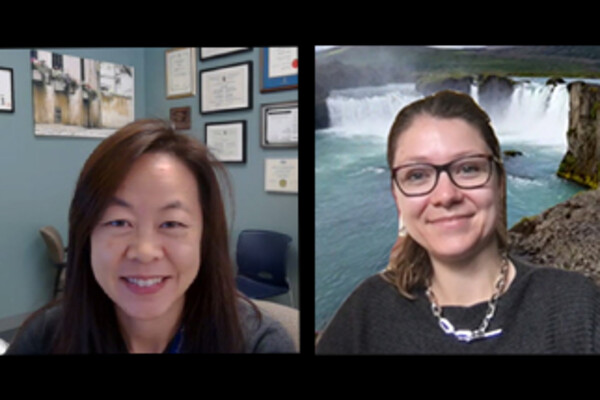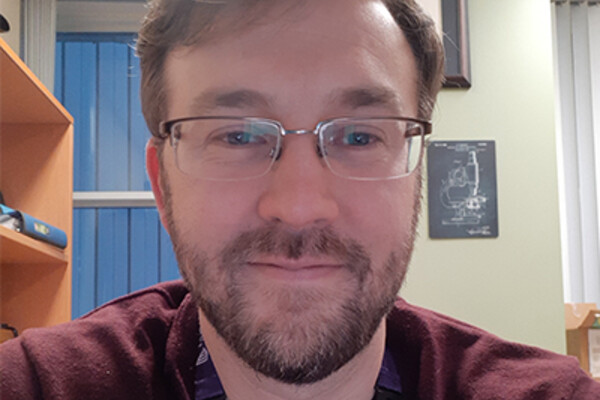Main Second Level Navigation
- Faculty Directory
- Academic Appointments
-
Current faculty members
- Faculty development
- Professional values
- Annual Review
- Continuing Appointment Review and Three-Year Review
- Promotion and reclassification guidelines: to Assistant Professor
- Promotion guidelines: to Associate Professor and Professor
- Royal College of Physicians and Surgeons of Canada Academic Certification Program
- Continuing Professional Development (CPD)
Breadcrumbs
- Home
- Our Faculty
- Current faculty members
- Faculty development
Faculty development
The following faculty development programs are offered by
- the Department of Laboratory Medicine and Pathobiology,
- Centre for Faculty Development (CFD) which is a partnership between St. Michael’s Hospital and the Temerty Faculty of Medicine, and
- the Centre for Teaching Support & Innovation (CTSI) at the University of Toronto.
LMP Faculty Development Day

LMP Mentorship Program
LMP’s Mentorship Program supports the development of the faculty's scholarly activities (research, teaching and clinical skills), in addition, to promoting career satisfaction and optimal career management.
The mentor-mentee relationship will be a no-fault relationship and can be terminated at any time by either party without any repercussion to either party.
The LMP Mentorship Award recognizes the value of mentors and is overseen by the LMP Mentoring Committee. See LMP Faculty Awards in teaching, research and service for recipients of this award.
Program goals
To provide a welcoming atmosphere for new faculty by:
- assisting faculty members with career planning and advancement
- increasing awareness and knowledge about opportunities in teaching, research and creative professional activity.
To enhance academic productivity, career satisfaction and retention of faculty.
To provide an introduction to LMP, the Temerty Faculty of Medicine and the University of Toronto.
Mentees
The program is open to all LMP faculty members at any stage of their career, with a focus on faculty in the early stages of their careers.
If the mentor-mentee relationship ends prior to the 3-year review, the Mentoring Committee will work with the mentee to assign another mentor.
At the request of the mentee and with the agreement of the mentor, the mentor-mentee relationship may continue beyond the 3-year review and will be supported by the LMP Mentoring Committee. However, continuation of the mentor-mentee relationship beyond the 3-year term is not mandatory.
If the mentor does not wish to continue, the mentee can ask for another mentor and the Mentorship Committee will help the mentee find another mentor.
Mentees will have input into the matching process, i.e. mentees will have the opportunity to request a specific mentor or an additional mentor to that assigned.
Roles and responsibilities for mentees
As a mentee, you will:
- take responsibility for making arrangements to meet with your mentor at least three times per year
- prepare short term and long term goals to be discussed with your mentor
- consult with your mentor to plan/ decide on your career path (research vs. Creative Professional Activity (CPA) vs. teaching)
- send your mentor, at least one week prior to your meeting, an updated activity report
- participate in faculty development opportunities offered by the department and/or Temerty Faculty of Medicine (e.g. Centre for Faculty Development workshops)
- participate in the evaluation of the mentoring program.
Mentors
Mentors provide confidential counsel and assist in the goal of promoting a successful academic career – academically, clinically and personally.
The mentor is senior enough to provide useful counsel and is knowledgeable about the discipline of the faculty member, but is distant from lines of reporting and evaluation.
Mentors do not have a direct reporting relationship with respect to the mentee, at either a clinical, teaching or research level, unless the mentee requests that the mentor be involved in assessments.
Mentors are usually LMP faculty as they would be aware of the department’s expectations, resources and processes. A non-LMP faculty member may be the preferred mentor, or a team of mentors may be requested. Mentors can be sought from other departments from within or external to the University of Toronto.
Mentor participation is voluntary and each mentor will be assigned no more than two mentees at a time.
Roles and responsibilities for mentors
As a mentor, you will:
- meet with your mentee at least three times per year
- review all relevant material that your mentee provides
- help your mentee set appropriate professional goals, focus on a career path (i.e. research, Creative Professional Activity (CPA), or teaching) and advise on specific expectations for promotion
- encourage and help facilitate scholarly activities for your mentee including advice on seeking research funding, publication and authorship of manuscripts, introduction to key national/international figures in their area of interest and development of key skills such as teaching, and assistance in any other aspects necessary for them to succeed (e.g. non-academic life)
- participate in mentoring training opportunities offered by the department or and/or the Temerty Faculty of Medicine (e.g. Centre for Faculty Development workshops)
- participate in the evaluation of the mentoring program.
LMP Mentorship Committee
- Sharon Nofech-Moses Vice Chair of Promotions & Mentorship and Co-Chair, LMP Mentorship Committee and Professor, Sunnybrook Health Centre
- David Hwang, Co-Chair, LMP Mentorship Committee, and Professor, Sunnybrook Health Sciences Centre
- Samir Patel, Co-Chair, LMP Mentorship Committee, and Associate Professor, Public Health Ontario
- George Charames, Associate Professor, Mt. Sinai Hospital
- Jay Conner, Assistant Professor, Mt. Sinai Hospital
- Anjelica Hodgson, Assistant Professor, University Health Network
- Adriana Krizova, Assistant Professor, St. Michael's Hospital
- Vathany Kulasingam, Associate Professor, University Health Network
- Anita Nagy, Assistant Professor, Hospital for Sick Children
- Shinichro Ogawa, Assistant Professor, UHN Research Institute
- Michael Pickup, Assistant Professor, Ontario Forensic Pathology Service
- Susan Richardson, Professor Emerita, Hospital for Sick Children
Contact
For any questions about the LMP Mentorship Program, contact:
Xilonem Lopez
Academic Affairs Officer
lmp.hr@utoronto.ca
416-946-0552
Other programs for leadership development in LMP
LMP Leadership Funding
The department offers funding to support faculty members to attend a leadership course or conference and acquire the knowledge and tools to become excellent leaders in the field; and in turn, help us drive innovation in LMP.
This competition is open to faculty who meets the following criteria:
- appointment type is Tenure/ Part-Time Academic, Full-Time Clinical, Part-Time Clinical or Status-Only,
- at the rank of Lecturer, Assistant or Associate Professor,
- holds their primary academic appointment in LMP; and
- preference will be given to those who are active contributors to departmental activities and have matching funds from their Hospital Chief.
Call for applications is sent to eligible faculty in November.
LMP Leadership Sessions
The LMP Mentorship Committee partnered with the Joule's Physician Leadership Institute of the Canadian Medical Association to provide leadership sessions to our faculty.
These virtual leadership courses are open to all primary LMP (MD and non-MD) faculty.
Contact
For any questions about the programs listed above, contact:
Xilonem Lopez
Administrative and Appointments Assistant
lmp.hr@utoronto.ca
416-946-0552
Education Scholars Program: Centre for Faculty Development (CFD)
The Education Scholars Program (ESP) is a leadership development program for educators of health professionals.
The program's goals are to support and enable the success of health professional and health science faculty/staff in their many roles as educators.
Participants in this faculty development program meet for class Tuesday afternoons in the Li Ka Shing building at St. Michael’s Hospital for two academic years and cover topics under each of the three program themes:
- Teaching Excellence
- Scholarship and Curriculum
- Education Leadership and Career Development
Program objectives
- Support and enable the success of health professional educators in their roles as scholarly educators, education leaders and teachers as well as, faculty developers who support their colleagues in their educational work.
- Create a foundation for building an inter-departmental, inter and intra-professional, and inter-faculty community of practice within the program as well as facilitating their integration into the greater community of scholars in health professional education both locally and beyond.
- Prepare current and future education leaders in the health professions and health sciences.
Education Scholars Program brochure (PDF)
Education Scholars Program on the Centre for Faculty Development (CFD) website.
New and Evolving Academic Leaders Certificate Program (NEAL): Centre for Faculty Development (CFD)
The New and Evolving Academic Leaders Certificate Program is designed to provide leadership development to academic leaders and to foster a productive, visionary and collaborative academic leader in the Academic Health Science System.
Participants will become members of a community of leaders who have the mindsets and capabilities to successfully run their division, research, education or other academic unit and help their faculty be successful.
Specifically, they will be competent in the four practices of academic leadership:
- intrapersonal
- interpersonal
- organizational
- system
The program is designed on three four-day modules over the course of one year with coaching and web-based distance learning in between.
Program objectives
Participants will be able to:
- Apply specific reflective and self-management strategies to enhance their leadership style and agility
- Describe effective academic leadership practices and capabilities
- Define academic success and pathways for achievement
- Apply effective tools for interpersonal communication, engagement, negotiation and mediation with faculty members and other academic colleagues
- Utilize Integrative Thinking™* and complexity informed techniques for solving problems unique to an academic setting - based on work developed at the Rotman School of Management
- Describe methods and systems for enabling change in their academic units
- Utilize economic management tools for financial decision-making
- Design performance management strategies for supporting faculty and academic unit success
- Develop their visioning and strategy skills for their academic unit
- Identify and navigate the various university and health care system roles and relationships.
The program will cover
- University leadership activities or roles within the academic health science network
- Workplace-based learning
- Application of learning to an academic leadership project
- Participants working on context relevant stretch goals and shared issues
- Individual coaching
- Leadership shadowing
- Enabling change in complex academic health science settings.
- Building collaborative and distributed leadership capacity
- The development of a network of academic leaders
Completion of the program will result in a University of Toronto certificate of added qualification - program accreditation application is in progress.
Eligibility
The program accepts applications from individuals, both nationally and internationally, with faculty appointments in the Temerty Faculty of Medicine or the Faculty of Health Sciences who have academic leadership roles and/or responsibilities. Such leaders, with or without formal institutional roles, are engaged in the academic mission of research, education or program development.
Their roles or responsibilities could include, but are not restricted to:
- vice-deans
- chairs
- vice-chairs
- chiefs of academic departments; research program or institute leads
- university unit heads such as: clerkship, residency, graduate program, clinical education, work placement, curriculum or centre leaders.
Enacting leadership is essential to the program and there is a leadership project requirement that participants will need to fulfill.
More information
New and Evolving Academic Leaders Certificate Program (NEAL) brochure (PDF)
New and Evolving Academic Leaders Certificate Program (NEAL) on the Centre for Faculty Development (CFD) website.
Stepping Stones Certificate: Centre for Faculty Development (CFD)
This accredited program is designed to assist teachers with their educational and teaching roles.
A Stepping Stones Teacher Development Certificate will be awarded after completion.
Participants are expected to:
- attend at least 26 hours of workshops and CFD round presentations within two years.
- accumulate an additional 14 hours of training, within one academic year, through participation in journal club.
- review specific articles related to various aspects of teaching and learning theory from a wide array of health professional education literature pertinent to all levels of the teaching experience.
Program objectives
- describe several evidence-based strategies for teaching in a variety of clinical contexts
- describe some of the theoretical basis for clinical teaching strategies
- demonstrate newly acquired teaching skills
- demonstrate enhanced critical appraisal skills of the health professional education literature
- acquire a positive attitude towards implementing and initiating change in clinical teaching
- identify the ways in which scholarship can be introduced into teaching and education activities
- describe a strategy for implementation of their own career development plan
Stepping Stones on the Centre for Faculty Development (CFD) website.
Centre for Faculty Development workshops
The Centre for Faculty Development (CFD) offers faculty workshops to assist faculty in their career development in the Temerty Faculty of Medicine at St. Michael’s Hospital.
Centre for Teaching Support and Innovation at the University of Toronto
The Centre for Teaching Support and Innovation (CTSI) provides leadership in teaching and learning at the University of Toronto and offers support for pedagogy and pedagogy-driven instructional technology for all teaching staff and graduate teaching assistants across all of the university’s campuses and divisions.

The Department of Laboratory Medicine & Pathobiology in the Temerty Faculty of Medicine offers funding to develop the leadership skills of faculty members. This year Dr. Mirette Hanna, Dr. Manal Tadros, and Mr Will Tsui receive the funding.

Dr. Joseph Ferenbok talks about his experiences on the Course in Effective Online Teaching Practices (EOTP), a 26-week course addressing essential teaching skills and knowledge that are fundamental to being an effective university educator, both in person and online.

Dr. Yulia Lin (Sunnybrook Health Sciences Centre and the Department of Laboratory Medicine & Pathobiology) and Dr. Rosemarie Tremblay-LeMay (Department of Laboratory Medicine & Pathobiology) discuss the benefits of mentoring and why Dr. Lin was awarded LMP’s Outstanding Mentor Award.

We offer funding to at least two faculty members each year to develop their leadership skills. Dr. Daniel Beriault, Assistant Professor in LMP and Head of Biochemistry in the Department of Laboratory Medicine at Unity Health Toronto, received the funding and talks about how it has benefited him and his department.
